The Winter of Artifice Read online
Page 10
My image ofHans up to now so clear became blurred. Because now that Johanna was living with Hans he was again fighting windmills, exhausting himself in blind, petty rages. She was inflicting venomous wounds, undermining his confidence, attacking his book—because he hadn’t given what she considered a true portrait of herself!
I was tormented with anxiety because I could do nothing for him, noteven see him for a moment. Johanna was watchful and tense, like an animal on a scent.
We sat together at cafés, our knees touching, looking at each other lucidly at first, and then surrendering toour own power over each other as to a consoling drug. We postponed the bitter war, eluded the moment of revelation. I felt like a puppet who was being torn apart. I could no longer keep clear and separate my image of Hans and Johanna. They were drawing me into their own tangle as into a whirlpool. I felt myself being drawn into their war, being forced to admit, to confess my allegiance. Johanna wanted the absolute, the choice, the decisive open choice. She was always insisting: “Whom do you believe, Hans or me?” Always working feverishly to divide us. It was always the ridiculous aspect of Hans, the caricature of him which she revealed to me, knowing well that a defeated Hans would hurt me, knowing well that a raging, frantic Hans was the supreme antithesis to the Hans I had been living with.
Johanna was making a supreme effort to reassert herself, to dominate and possess him again. But why does she want to possess him again only to leave him again dispossessed and reduced?
It was this implacable destruction, this necessity forone to triumph over the other, which incensed me. Why couldn’t Johanna be great without killing Hans? Why couldn’t Hans be great without first killing Johanna? Why must either of them be enriched and saved only by means of the other’s death?
Destruction the sole measure of strength – that was an attitude I found impossible to share. Strength is evinced through creation, I thought. I would not feel greater by triumphing over Hans. I could only feel great if Hans were made greater through me.
War! The necessity of war!
Johanna and I in a taxi, holding each other closely. Johanna saying: “You are giving me life, you are giving me what Hans has taken away from me.” And I heard myself answering with fevered words of passion. Our knees locked, our hands locked, kissing in full awareness of our rivalry. Our enmity rumbling low, deep, watchful.
It was like madness forme to be carrying this diamond lodged in the middle of my forehead, the hard light of my lucidity, of my vision, thinking of means to save Hans while exchanging warm kisses with Johanna. Who is the innocent one?The onewho loves. I feel that Johanna does not love Hans. Who is the human being? The onewho really suffers from the loss of his love. I feel that Johanna would never suffer as I would. She would suffer only in her pride. Who is the cleverest? Who the strongest? The one who loves the least, the one who fights for the triumph of his own ego.
Johanna said: “I am afraid of your eyes,” and she made herself small in my arms. “Your eyes pierce every veil.”
And as Johanna whispered in my ear I recollected the closing words of Hans’ letter: “Thanks to you I am not being crushed this time. Don’t lose faith in me, I beg you.”
* * *
Hans came to see me. He tried to kiss me and I would not let him. No, I could not bear that. No, he should not touch me—that would hurt me. He was baffled.
“I want you more than ever,” he said. “Johanna has become a stranger to me. The first two nights with her I could not feel any passion. I love you, and with you alone I feel the connection between the image I carry in me and my desire. There’s no such thing as loving two women. You have displaced Johanna.”
Before he had finished I had surrendered. The closeness seemed profoundly natural. There was nothing changed.
After a while he said:
“Doesn’t Johanna bore you? I find that she talks too much.”
“We have so much to say to each other.”
“Nobody can say to Johanna: ‘Listen, listen deeply.’ I can only make her listen by violence. What do you do that she listens to you?”
“I just look at her.”
“But what do you have to say to each other?”
“If I gave you my own idea and my own image of Johanna, Hans, you would love her. There’s a great deal of mystery in our world, a great deal that will never be clear to you. You think I must know more, because I am a writer, that it must all be clear to me. But all I can say is that there is a world which is closed to you. Johanna has slipped between your fingers. I won’t tear her to pieces as you have done.”
I touched Johanna’s bracelet without looking at it, like a talisman.
“I sit down and try to tell you, to tell you what I’d much rather go on living ecstatically, unbeknown to you—to all. You beat your head against the walls of our world, yes, and because I am an artist you think I will give away the mystery. I will say what Johanna is. I will tear the veil. But to-day I hate my work, Hans. I don’t want to formulate, to force out the delicate, the vague, the voluptuous into the daylight of words. I renounce my mind and my work. I would much rather just live.”
We were lying on the couch, under the window of colored stones. Many, many afternoons we had lain on this couch, looking up at the light coming through the colored stones.
It was not the window which gave on the garden, on its old ivy like the long arms of a furry-haired monkey twisted around the walls. It was not either the window which opened on the sky, showing the bare skeleton of trees in winter. It was for us a window opening on a world we had made together according to our own vision. The Orient-blue stones, the turquoise, the geranium red, the midnight blue, the Veronese green, the chrome yellow, the carmine, those were like the colors of our own moods which gave to sky, sun and moonlight and daylight their own individual hues, which deformed the shape of trees into unknown trees, an unknown world. This other world we entered as soon as we were alone, with a language of our own. This world, slowly, given them, created out of a particular manner of looking at things, at people at events, at new books, pivoted on the axis of a twin vision and purpose, on my faith in his purpose and his vision, my devotion to his purpose… this widely expanded world, made out of vast ideas, out of caresses, out of faith, out of fears and courage… it was this world we saw lying on the couch after the blood fusions, after the intermingling of breath and blood through the colored window with its constellations of hues like the hues of our moods and our particular vision. At first indistinct, and then so immense and potent and indestructible, because everything always flowered between us. This window opened on our multi-formed and multi-colored universe, with its big rhythms and sweeps and profound intensity.
Everything else was an excursion.
“What did you and Johanna talk about?”
I told him everything that these two days with Johanna contained. I exposed all my feelings to him, all my fevers, all my turmoil. I let him read into me nakedly. All former surrenders to him seemed but half a gift, compared with this exposure of myself, this breaking up of myself, this absolute dissolution of myself into him.
I gave myself to him by truth. Nothing else was of importance but our world, the integrity of our world. It was not important that I should have found another who was part of myself, a fragment of myself. It was not important that I should have found Johanna who completed me, because I as an artist had lived marginally, whereas Johanna had given all her life to sensations and gestures. It was not important that I should have found the face I wanted to see in the mirror, that other side of myself, daring, fiery, manifesting itself in acts. My free self! The incarnation of my imaginations, of my inventions. That was not important—that was the pursuit and the love of the self. To love Johanna was merely to love myself, the desired, unrealized, unformulated half of my self.
What I loved to-day, far, far above this self, was Hans. Hans, the other.
To-day I had been treacherous to woman and to myself and to the shadows of myself. I
had yielded up the proud and isolated self and all self-seeking.
And he—he lay there quietly, almost broken by a gentle, tolerant wistfulness.
“You and Johanna have something to give to each other. The love you describe is wonderful. I certainly can’t hate or despise that. I see what you give each other. I’ve just realized that what I give is something coarse plain, compared to that.”
I stopped him.
“You don’t know what you have given me!” I could not continue. My eyes blurred.
* * *
Johanna, Hans and I. His manuscripts spread on the table. Hans was saying very gently:
“I can’t work here. I’d like to go to Djuna’s place a few days. You understand, Johanna, this is the most important period of my life as a writer.”
“You don’t have to leave,” exclaimed Johanna hastily, “I’ll leave, I’ll go away as soon as I can get the money. I’ll go away to-night—I’ll always find some one to stay with.”
“I’m not asking you to leave,” said Hans, “only to leave me alone. I can’t work when you’re around. I can’t work! And the way I feel now I’d commit a crime in order to finish this book!”
I understood this strange, abstract mood, his brassiness. His eyes were black and hard. He was again the supreme egoist, the artist. But Johanna was weeping hysterically, her whole body shaking, raving wildly about him not being a human being, that she must fight him to protect herself against him, that if she stayed with him she would kill herself or do something mad. His work offended her, as a woman. She could only allow it if it glorified her.
At this moment I was not a woman. I was a writer too. I wanted Johanna to go and leave Hans to his work. I felt inhuman myself. Everything was blurred and distorted and magnified by the demon in both of us, the demon of literature.
Johanna’s grief left me unmoved. What stirred was Hans’ cry: “Let me work!”
Johanna got up, trembling.
“You’re better,” she said to Hans, “you’re better in some way that I can’t understand, and you’re worse in a way which crushes me. There’s something in you I can’t seize. I won’t be a slave to your ideas! You’re too spiritual a man. I’m the wrong woman for you.”
I wanted to say: “You love only the man, and the man is only half of Hans.”
Johanna stood ready to leave us, with her hair falling about her shoulders. At this moment her beauty seemed to have reached its climax. I was awed by the ripeness, the opulence of her body under her black cape, by the savage, almost phosphorescent glint of her eyes, by the dewiness and petal transparency of her skin. Johanna at this moment did not seem like a woman, but like some mythological figure of woman. Never did the aureole of this beauty shine so like a legend. I was awed. And awed too that this beauty could be submerged and swept away by a greater power—the great unswerving flow of creation. And it was to this force of creation that I responded as to a greater passion—the great inhuman passion.
Johanna left the room. Hans and I looked at each other with a profound understanding. Then I rose to follow Johanna. In the dark hall I took her in my arms. I caressed her hair, I lulled her with sweet words. I whispered her name caressingly. “My little Johanna, my poor little Johanna.” I caressed her like a child until her sobs subsided.
* * *
Johanna and I in a taxi. My arms becoming strong. It is I who am throwing back Johanna’s head. It is I who am kissing Johanna’s throat. And Johanna melting. An orgy of soft flesh. Johanna in my arms taking refuge from her fears of me, so that I might not judge her, not measure her. I would not see her while she lay in my arms. I could see only the forked lightning of her fear.
When I left the taxi I saw the blurred face of Johanna staring through the window. I saw this face behind the window, pleading like the face of a woman drowning. The face of the child frightened and unsure of love, frightened and struggling to wield power through mystery and mystification. A child caught in the great dark strain of lies and fantasies. Every gesture one of frenzied singularity to compel love and admiration. Johanna, little Johanna, beautiful Johanna, sometimes wise and sometimes empty! Johanna with her life all exterior and without core. Believing only in drama, in gestures, in appearance, in war, in outward and visible movement. Believing that a kiss can silence all judgment, believing like a whore that the soul can be traded, the body offered in exchange. Johanna, the born whore, who would triumph as a whore. But Johanna, the soul will not be traded!
This face behind the window, pleading, I saw in it the face of a woman drowning. I saw Johanna struggling to the bottom of the sea, with terror written on her face, the terror of monsters invisible to men. I could see in her face the submerged continents over which the ghost of Johanna borne on a manticore, had wandered. Johanna had seen the mantic religiosa which waits for its prey in a devotional attitude, and the giant crabs that cling to the marabou hair of shell flowers and choke them; she had seen the slimy coil of the octopus strangling the slippery necks of eels; she had seen the wrecks of ships gathered in glutinous cradles of moss, the rotted wood crawling with worms and the bodies of the dead, swollen and burst, staining the water with twisted entrails. She had been terrorized by the gold clarity of the sea on which the giant black birds threw purple shadows, and by the monstrous, phosphorescent eyes of the night which guided her course. She had experienced every terror and they trembled now in her face as she gazed at me through the watery taxi window.
A smile of immeasurable distress…
But in another instant, like a cloud passing over the face of the moon, it was effaced by another smile, the smile of the whore. It was this old, impenetrable smile which brought back to my mind the full impact of that moment when Johanna’s head, like a heavy flower broken from its stem, had fallen on my shoulder. It was this whore’s smile of Johanna which set the world rocking again as I stood there watching the taxi carrying Johanna off. Pity, protection, solace—they fell away from me like gifts of trivial import. I walked away unsteadi, like a man returning from a heavy debauch. I forgot about Johanna’s terror, forgot the child-face peering hungrily through the taxi window.
The taxi had taken care of my impulse, had thwarted it, with that banal fatality with which the petty and the trivial often arrests the most stupendous gestures. The taxi, the ordinary reality in which it moved, the rhythm it obeyed—allowing just that fatal, ordinary moment it required for two persons to part—it was this which had ordained the evolution of my emotion and the duration of it. It was this which allowed me to let Johanna depart with her deep distress, like a whore one has finished kissing, instead of withholding her and making her the gift of my love.
The trifling incident that had arrested the expression of my impulse, the passivity I had displayed, my inertia when confronted with the need of vital action which ought to follow every flash of understanding, the way I submitted to the taxi driver’s automatism, all this was no more amazing than the feeling I had that this was the moment when I understood Johanna’s potentialities or desires as I would never again be able to. Or rather, that this was the moment when I might have conveyed to her how deeply I understood her aspirations, but that I could only express this if Johanna were dead or removed from me by some contrast in our moods, some effective enmity between us. Thus fulfilling the inner fatality which makes of fusion the most evanescent of human attainments.
UNLESS SOME DAY JOHANNA SHOULD READ THIS BOOK.
* * *
We were walking together over dead leaves crackling like paper. Johanna was weeping, and I was weeping with her and for her. We were walking through the city as it sank into twilight and it was as if we were both going blind together, with the bitterness of our tears. Through this blurred city we walked, hazily and half lost, the light of a street lamp striking us now and then like a spotlight, throwing into relief Johanna’s distorted mouth and the broken line of her neck where the head fell forward heavily, as if she had been guillotined. The buses came upon us out of the dark, violently
, with a deafening clatter and we had to leap out of their way, only to continue stumbling through dark streets, crossing bridges, passing under heavy arcades, our feet trembling on the uneven cobblestones, as if we had both lost our sense of gravity, as if we were treading already some other substance.
Johanna’s voice was plaintive and monotonous, like a lamentation. Her eyes wavered, but always fixed on the ground, as if the whole structure of’ her life lay there, burnt and tattered, and she were watching its consummation.
I was looking straight before me, through and beyond the dark, the lights, the traffic, beyond the buildings. Eyes fixed, immobile like glass eyes, as if the curtain of tears had opened a new realm.
Johanna’s phrases surged and heaved like a turgid sea. Unformed, unfinished, dense, heavy with repetitions, with recapitulations, with a baffled, confused bitterness and anger. I could find nothing to say for the moment—because Johanna was talking about God. Yes, Johanna was talking about the god in man—the god she had sought in Hans.
“I wanted to serve him,” she was saying, “I wanted to make him great, because I felt that he was good, that he was so infinitely better than myself… I felt that I was vile and foul, a liar and a beast. But Hans! Jesus, there was something so good, so charitable in him. He had such an immense compassion… And then when I read what he had written about me—the drabness, the cheapness of my life… No, he’s no god, I know that now! I know that he is treacherous. Only the other night, Djuna, after you left, the other night when I came back to him, I came back to confess everything. I wanted to make myself clean again, I wanted to kneel before him—I did get down on my knees—and have him forgive me. I felt then, as I had often felt before, that he was the most wonderful being I had ever known, that he was the only truly human being I knew. I felt him to be holy—truly. He was like a saint to me. I felt so humble, so less than nothing. I came back to worship at his feet… But what happened? I came back to find him hard, indifferent, cynical. He almost laughed in my face. I seemed so insignificant to him that even my devotion, my worship of him, meant nothing to him… No, he’s no god to me… not any more! I am the god now. It’s I, I, who am the god! Not him! The sacrifices I made for him have made me great. I am bigger than he is now! I have known what it meant to sacrifice one’s self, but now I don’t need to sacrifice myself any more. I’m beyond that… beyond him. Once I needed a god to serve. I needed Hans so—he was a god to me—and I had to serve some one. But he failed me. I have served some one who is less than I am…”

 Diary of Anais Nin, Volume 5
Diary of Anais Nin, Volume 5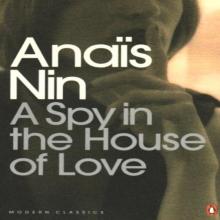 A Spy in the House of Love
A Spy in the House of Love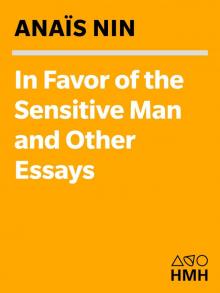 In Favor of the Sensitive Man and Other Essays (Original Harvest Book; Hb333)
In Favor of the Sensitive Man and Other Essays (Original Harvest Book; Hb333)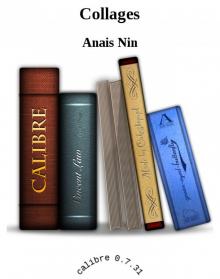 Collages
Collages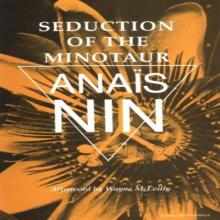 Seduction of the Minotaur
Seduction of the Minotaur Children of the Albatross
Children of the Albatross Delta of Venus
Delta of Venus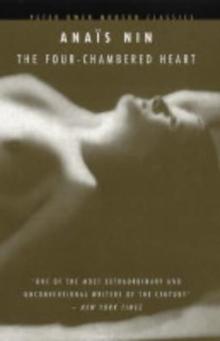 The Four-Chambered Heart coti-3
The Four-Chambered Heart coti-3 Diary of Anais Nin, Volume 2
Diary of Anais Nin, Volume 2 Diary of Anais Nin, Volume 1
Diary of Anais Nin, Volume 1 Diary of Anais Nin, Volume 4
Diary of Anais Nin, Volume 4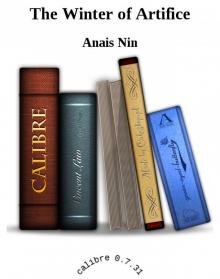 The Winter of Artifice
The Winter of Artifice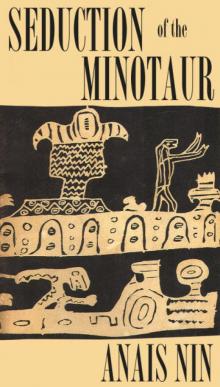 Seduction of the Minotaur coti-5
Seduction of the Minotaur coti-5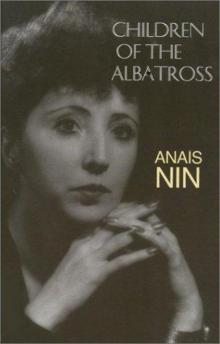 Children of the Albatross coti-2
Children of the Albatross coti-2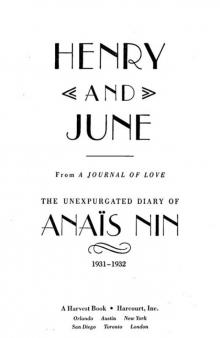 Henry and June: From A Journal of Love -The Unexpurgated Diary of Anaïs Nin (1931-1932)
Henry and June: From A Journal of Love -The Unexpurgated Diary of Anaïs Nin (1931-1932) Ladders to Fire
Ladders to Fire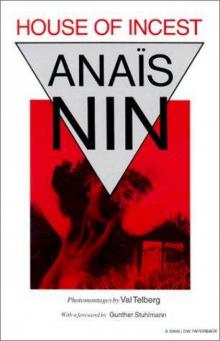 House of Incest
House of Incest